|
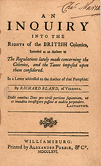 |
[15] Taxing the Colonials
Bland, Richard, 1710-1776. An enquiry into the rights of the British colonies... Williamsburg: A. Purdie, 1766.
The British monarchy was also in need of fiscal reform as a result of the costs of the Seven Years’ War. In a series of acts intended to have the colonists pay for their own defense, such as the Sugar Act, the Stamp Act, and the Townshend Acts, colonists found essential goods increasingly burdened with taxes. The Acts were passed, moreover, by a Parliament that did not include elected representatives from the colonies. Richard Bland penned An enquiry into the rights of the British colonies to articulate his views on the proper relationship among sovereign, Parliament, and colonies.
|
  |
[16] Common Sense
Paine, Thomas, 1737-1809. Common sense: addressed to the inhabitants of America… Providence: J. Carter, 1776.
Issued in the midst of the American Revolution, Thomas Paine’s Common Sense argued the case for independence from Great Britain. Drawing on Enlightenment philosophy and written in the form of a sermon, within a year it had sold over 500,000 copies and been re-printed in twenty-five editions. Paine argued, among other things, that “any submission to, or dependence on Great Britain, tends directly to involve this continent in European wars and quarrels…” thus turning friends into enemies and damaging American trade. |
 |
[17] France and the American Revolution
Great Britain. Articles de la capitulation faite entre Son Excellence le général Washington, commandant en chef des forces combinées de l'Amerique & de France. Son Excellence le comte de Rochambeau, lieutenant général des armées du roi de France, ... et Son Excellence le comte de Grasse, lieutenant général des armées navales de Sa Majestłe très-Chrétienne ... d'une part: et le Très-Honorable le comte Cornwallis, lieutenant général des forces de Sa Majesté Britanique, ... de l'autre part.[Newport, R.I, 1781].
While Paine argued that America should stay out of European conflicts, French participation was essential for the success of the colonies’ struggle for independence. Here is what is believed to be a unique copy of the articles of surrender between Washington and Cornwallis, printed in Newport on a press brought from France. |
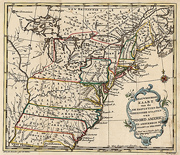 |
[18] European Observations
Robin, abbé, 1750-1794. Nieuwe reize door Noord-Amerika, in den jaare 1781. Amsterdam: Allart and Holtrop, 1782.
Claude Robin accompanied Rochambeau (in command of the French forces) as a chaplain. His account of the Revolution originally appeared in Philadelphia and Paris in 1781, with the Philadelphia edition being produced by the same printer as Paine’s Common sense. German and Dutch editions soon followed. |


|
[19 & 20] Common Sense / Sens-commun
Paine, Thomas, 1737-1809. Le sens-commun. Ouvrage adressé aux Américains, et dans lequel on traite de l'origine et de l'objet du gouvernement, de la constitution angloise, de la monarchie héréditaire, et de la situation de l'Amérique Septentrionale. Paris: Gueffier, 1791.
Paine, Thomas, 1737-1809. Droits de l'homme; en reponse a l'attaque de M. Burke sur la Révolution françoise. Paris: F. Buisson, 1791.
Thomas Paine’s argument against foreign entanglements acquired a different valence in France following American independence. French assistance during the struggle depleted the treasury. In an effort to raise funds, a new tax code was adopted, one which included taxing the nobility and clergy. Previously exempt, the move alienated two important sectors of French society. |

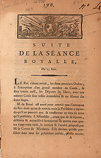
|
[21 & 22] The French Revolution
La Chaise, M. de. Lettre d'un américain aux citoyens françois, sur la representation. [Paris? : s.n.], 1789.
Suite de la séance royalle [sic], du 23 juin. [Paris? : s.n., before 1789]
The French Estates-General, a largely powerless legislative assembly, had not met since 1614. In response to the new financial demands, the Assembly of Notables called on the king to summon the Estates-General in 1787. Set to meet in May 1789, it was to be comprised of the clergy (First Estate), the nobility (Second Estate), and the commoners (Third Estate). Conflicts arose over the composition and voting rights of the Estates, since the First and Second Estates only represented 3% of the population, but each Estate received a single vote. By 17 June 1789, events had reached an impasse, and the representatives of the Third Estate declared themselves the National Assembly, representing all of France. This report of the “séance royalle” of 23 June describes the king’s attempts to reestablish the Estates-General and the precedence of the three orders, an attempt that failed and was followed by the nobility joining the National Assembly and the end of the Estates-General. |
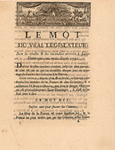
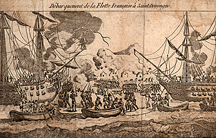
|
[23 & 24] The Haitian Revolution
Le mot du vrai législateur, sur la révolte & les incendies arrivés à Saint-Domingue, au mois d'août 1791. [Paris : s.n., 1791].
Débarquement de la flotte française à Saint-Dominigue… Paris: chez Tiger, [1820?]
Saint-Domingue was the richest of France’s colonies, and had a slave population of 500,000 by 1789. It also had a large population of “gens de couleur,” (free people of color). Educated and literate, serving in the military or as administrators, free people of color owned property but did not have full civil equality with whites. Julien Raimond, a free man of color, had been arguing for full equality while in France, and the formation of the National Assembly provided him an opportunity to further the cause. The National Assembly finalized the Declaration of the Rights of Man in late August 1789, which stated that all men were free and equal. Raimond’s aide, Vincent Ogé, returned to Saint-Domingue convinced that the Declaration provided full equality and demanded the right to vote. The colonial governor refused and the dispute sparked an uprising that was primarily a dispute between the whites and free people of color with slaves watching from the sidelines. However, when a slave rebellion began in August of 1791, Ogé’s execution was cited by slaves as one among many grievances.
In an anonymous speech before the National Assembly, Le mot du vrai législateur, the author demands retribution against those responsible for the slave rebellion. However, the rebellion was so successful (and in fact had evolved into a civil war) that the National Assembly sought ways to maintain its colony by granting full civil equality to free people of color and sending 6,000 troops to Haiti to quash the revolution. |
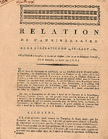 |
[25] Exodus from Saint Domingue
Relation de l'anniversaire de la fèdération [!] du 14 juillet 1789, : célébrée à Carleston [sic], le sextidi 26 messidor, l'an 3e. de la Republique française, une & indivisible, 14 juillet 1795. (V.S.). Charleston, [1795].
Many white planters and free people of color fled the island for Cuba, Louisiana, Charleston, and elsewhere. This relation of the anniversary celebration of Bastile Day was printed in Charleston, South Carolina in 1795. |
| |

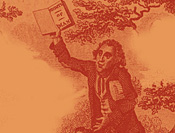

![]()










